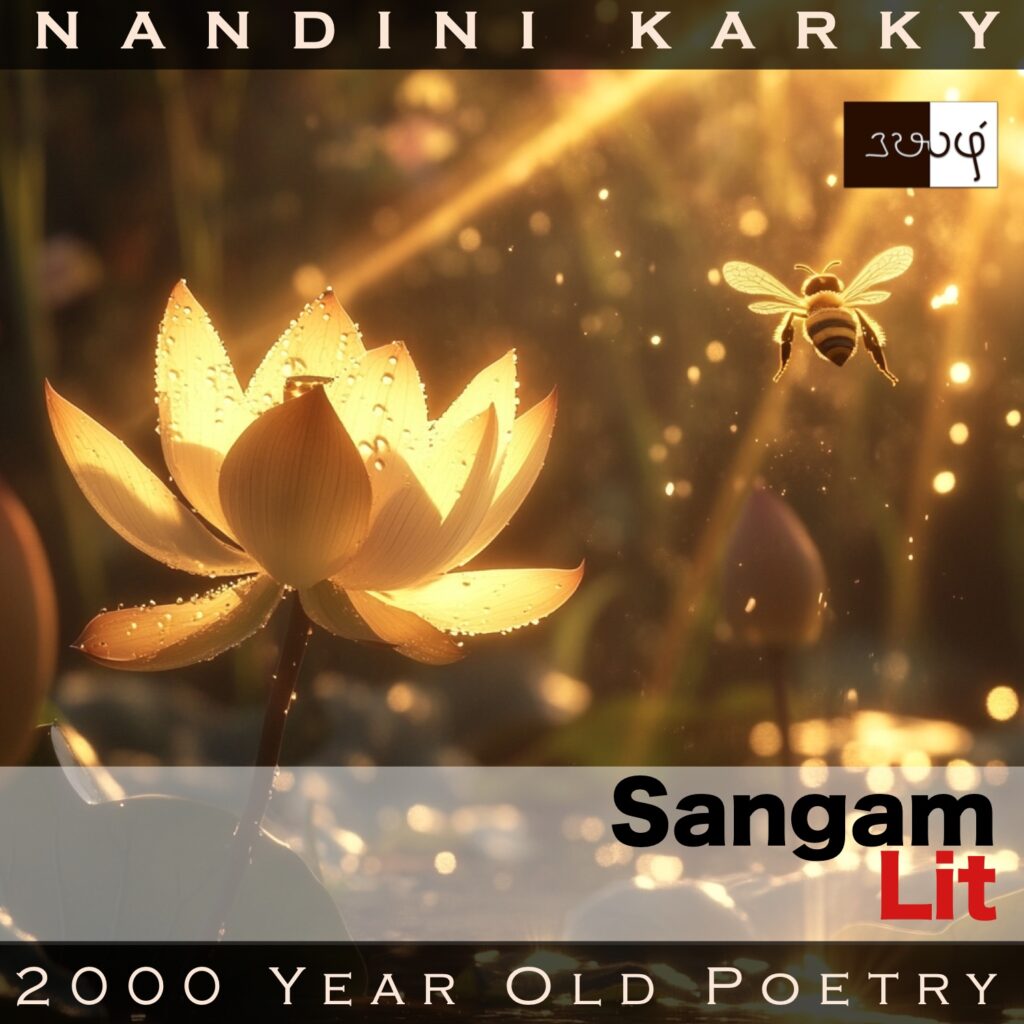Sangam Lit

Kalithogai 71 – Debunking false oaths
In this episode, we perceive a lady’s fury at her man, as depicted in Sangam Literary work, Kalithogai 71, penned by Maruthan Ilanaakanaar. The verse is situated in the ‘Marutham’ or ‘Farmlands landscape’ and sketches the lady’s disappointment in the words of the man’s supporters.

விரி கதிர் மண்டிலம் வியல் விசும்பு ஊர்தர,
புரி தலை தளை அவிழ்ந்த பூ அங்கண் புணர்ந்து ஆடி,
வரி வண்டு வாய் சூழும் வளம் கெழு பொய்கையுள்
துனி சிறந்து இழிதரும் கண்ணின் நீர் அறல் வார,
இனிது அமர் காதலன் இறைஞ்சித் தன் அடி சேர்பு,
நனி விரைந்து அளித்தலின் நகுபவள் முகம் போல
பனி ஒரு திறம் வார, பாசடைத் தாமரைத்
தனி மலர் தளை விடூஉம் தண் துறை நல் ஊர!
‘ஒரு நீ பிறர் இல்லை, அவன் பெண்டிர்’ என உரைத்து,
தேரொடும் தேற்றிய பாகன் வந்தீயான்கொல்
ஓர் இல் தான் கொணர்ந்து உய்த்தார் புலவியுள் பொறித்த புண்
பாரித்துப் புணர்ந்த நின் பரத்தைமை காணிய?
‘மடுத்து அவன் புகுவழி மறையேன்’ என்று யாழொடும்
எடுத்துச் சூள் பல உற்ற பாணன் வந்தீயான்கொல்
அடுத்துத் தன் பொய் உண்டார்ப் புணர்ந்த நின் எருத்தின்கண்
எடுத்துக்கொள்வது போலும் தொடி வடுக் காணிய?
‘தணந்தனை’ எனக் கேட்டு, தவறு ஓராது, எமக்கு நின்
குணங்களைப் பாராட்டும் தோழன் வந்தீயான்கொல்
கணங்குழை நல்லவர் கதுப்பு அறல் அணைத் துஞ்சி,
அணங்கு போல் கமழும் நின் அலர் மார்பு காணிய?
என்று, நின்
தீரா முயக்கம் பெறுநர்ப் புலப்பவர்
யார்? நீ வரு நாள் போல் அமைகுவம் யாம்; புக்கீமோ!
மாரிக்கு அவாவுற்றுப் பீள் வாடும் நெல்லிற்கு, ஆங்கு,
ஆராத் துவலை அளித்தது போலும், நீ
ஓர் யாட்டு ஒரு கால் வரவு.
Many interpreters have chosen to see this verse as said by a concubine or a mistress to the man. However, there is no distinguishing element to say that these words are not spoken by the lady, but rather by another woman, who is angered by the other courtesans the man is seeing. So, I chose to see this as the lady’s rendition to the man. The words can be translated as follows:
“As the sun with its spreading rays soars on the sky, seeing a flower let go of the tightness of its petals, feeding on its nectar, a striped bee buzzes around in that prosperous pond. Akin to the face of a woman, filled with sorrow and shedding tears copiously, which suddenly smiles, when her sweet lover pleads to her and takes refuge at her feet, with dew on one side, a lotus flower with thick leaves, suddenly glows when the rays of the sun fall upon it, in the cool shores of your fine town, O lord!
‘You are the only one! He doesn’t keep the company of any other women’, said that charioteer, swearing on the chariot. Why isn’t he here to see your appearance of having united with a courtesan, whom he brought to the house, as evident from the scars they left on you, when sulking with you?
‘I know all the places he goes to. I will not hide it from you’, said that bard, swearing oaths many on his lute. Why isn’t he here to see the imprints of the bangles on your neck, when embracing those who accept your many lies?
Even when I complained, ‘He has left me’, not seeing your faults, that friend of yours kept praising your good nature. Why isn’t he here to see your wide chest, fragrant like the scent of spirit maiden, because you slept embracing the black tresses of those wearing heavy earrings?
And so, why should I be angry with those, who savour your endless embraces? I will calm myself on that rare day you do come. You may leave now! Upon a crop of paddy that yearns with desire for a downpour, akin to a spray of scarce drizzle that renders, is your once-in-a-year arrival here!”
Let’s explore the details. The verse is situated in the context of a love-quarrel between the man and the lady, owing to man’s seeking of courtesans, and these words are said by the lady to the man. The lady starts by describing a lush pond in the man’s town, where a lotus flower can be seen with dew drops on its petals, and when the sun soars high in the sky, it shines with a special radiance, inviting the bees around. For this image, the lady renders an apt simile of the crying face of a woman, which lights up into a smile, when her beloved comes back to her, pleading at her feet. Then, the lady goes on to say how the man’s charioteer, bard and friend all swore to her that the man wouldn’t visit other women, wouldn’t go anywhere else and was full of good qualities. She asks the man why they were not there to see the obvious signs of the man being with other women, such as the scars from the wounds they inflicted on him in anger, the imprints of their bangles on his neck, and the fragrance of their tresses on the man’s chest. She concludes saying what’s the use of being angry with those women who enjoy the man’s embraces. Rather, she should learn to be at peace with herself, and says the man’s rare coming and going was just like a little drizzle that falls on a paddy field that’s waiting for a downpour. A verse which illustrates how the man’s friends and helpers rise to his defence, but they can do nothing before the perceptive eyes of the lady, who sees her man for who he is!






 Visit Podcast Website
Visit Podcast Website RSS Podcast Feed
RSS Podcast Feed Subscribe
Subscribe
 Add to MyCast
Add to MyCast